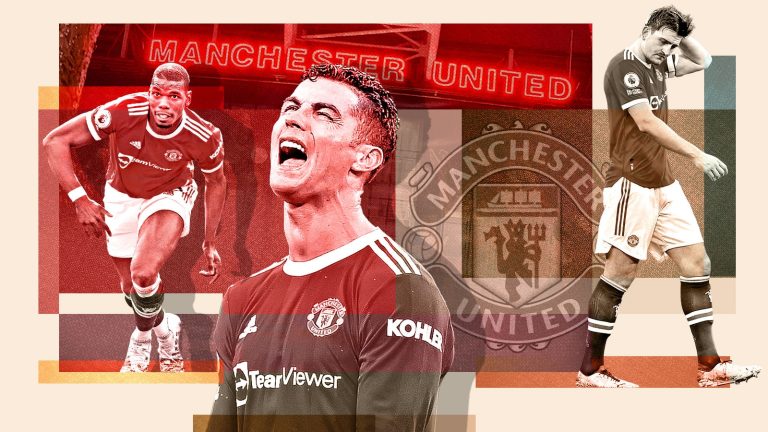Home » Manchester United’s Decade of Transfer Disappointment: What Went Wrong?
Manchester United’s Decade of Transfer Disappointment: What Went Wrong?

Manchester United is one of the most famous and historic football teams in the world. That being said, the club has been in a constant state of change and uncertainty since the famous Sir Alex Ferguson retired ten years ago, especially when it comes to transfers.
Man United has spent an incredible 1.32 billion pounds on transfers during this time, but they still haven’t won the Premier League title. Many people, both fans and critics, say that the club’s transfer activities are a big reason why they can’t get back to their past glory.
The Ferguson Era: A Singular Voice
In many ways, Sir Alex Ferguson was more than just a coach; he was Manchester United. When he left, a hole was hard to fill.
Each new manager made United’s character more open to change, which led to frequent shifts in the team’s playing style and direction. This constant flux led to wasted talent and underperformance on the pitch.
It was a very unstable time during David Moyes’s first and only season in charge, the 2013–2014 season. The club tried to sign top players like Cesc Fàbregas and Thiago Alcantara over the summer, but in the end, they signed Marouane Fellaini from Moyes’s old team, Everton, because he fit their straight style of play.
Moyes was fired in April 2014, even though they signed Juan Mata from Chelsea in January.
Van Gaal’s Tactical Shift
The arrival of Louis van Gaal in the 2014-2015 season marked a swift change in direction. Ander Herrera was signed to meet Van Gaal’s need for a disciplined, tactically aware midfielder. Luke Shaw, Marcos Rojo, and Daley Blind were also brought in. Blind had been taught by Van Gaal at the national team level.
When Angel DiMaria set a club record, it was the best thing that happened that summer. The clubs spent a total of 96 million euros on players like Bastian Schweinsteiger, Matteo Darmian, Memphis Depay, and Morgan Schneiderlin during the 2015–2016 season, which was another major change. Anthony Martial’s acquisition for 60 million euros late in the summer window raised eyebrows. Van Gaal did manage to win the FA Cup, but criticisms of a lack of entertainment on the pitch led to his dismissal.
Mourinho’s Impact and Big Signings
At the end of the season, Jose Mourinho took over as manager and made it easier to buy players.When Eric Bailly and Henrikh Mkhitaryan came; they broke the world record for the most expensive transfer ever paid to get Paul Pogba back. Zlatan Ibrahimović joined on a free transfer. During the 2017–18 season, Mourinho-type stars Romelu Lukaku and Nemanja Matić joined the team. United finished second in the league, their highest placement since Ferguson’s departure.
However, Mourinho’s tenure didn’t last, and he was replaced before Christmas in 2018. Ole Gunnar Solskjær took over, emphasizing counter-attacking play, which was reflected in United’s transfer strategy. Daniel James arrived from Swansea, and Aaron Wan-Bissaka was signed from Crystal Palace. The marquee signing was Harry Maguire for 87 million euros. In January 2020, Bruno Fernandes joined from Sporting Lisbon. However, despite these signings, Solskjær struggled to secure consistent results.
The Pandemic and Contracted Spending
The COVID-19 pandemic had a significant impact on football, and United notably scaled back their spending. Donny van de Beek and Amad Diallo arrived, while veteran Edinson Cavani joined on a free transfer in 2021. The summer of 2021 saw the high-profile signings of Jadon Sancho for 85 million euros, Raphaël Varane for 40 million, and the return of Cristiano Ronaldo. John Murtough became the club’s football director, indicating a shift away from coach-led signings.
Coaching Changes and Recent Signings
Despite the big-name signings, criticism persisted, with accusations of indecisiveness in the transfer market, especially in the pursuit of Jadon Sancho. Solskjær’s departure marked another coaching change, with interim manager Ralph Rangnick taking the reins before Eric ten Hag was appointed as the full-time manager.
Ten Hag’s arrival saw a new round of coach-centric spending. Christian Eriksen, and Anthony were signed. The club moved quickly to sign Casemiro after a humiliating early-season loss to Brentford.
Conclusion: A Lack of Long-Term Strategy
As of right now, Manchester United is still having a hard time keeping up with the best teams in the Premier League.
Even though they have spent a huge billion pounds, they still haven’t won the Premier League. The primary issue during this tumultuous decade has been the club’s tendency to prioritize the immediate needs of its coaches over a long-term, cohesive strategy. This has often resulted in a squad that lacks a clear identity or direction.
